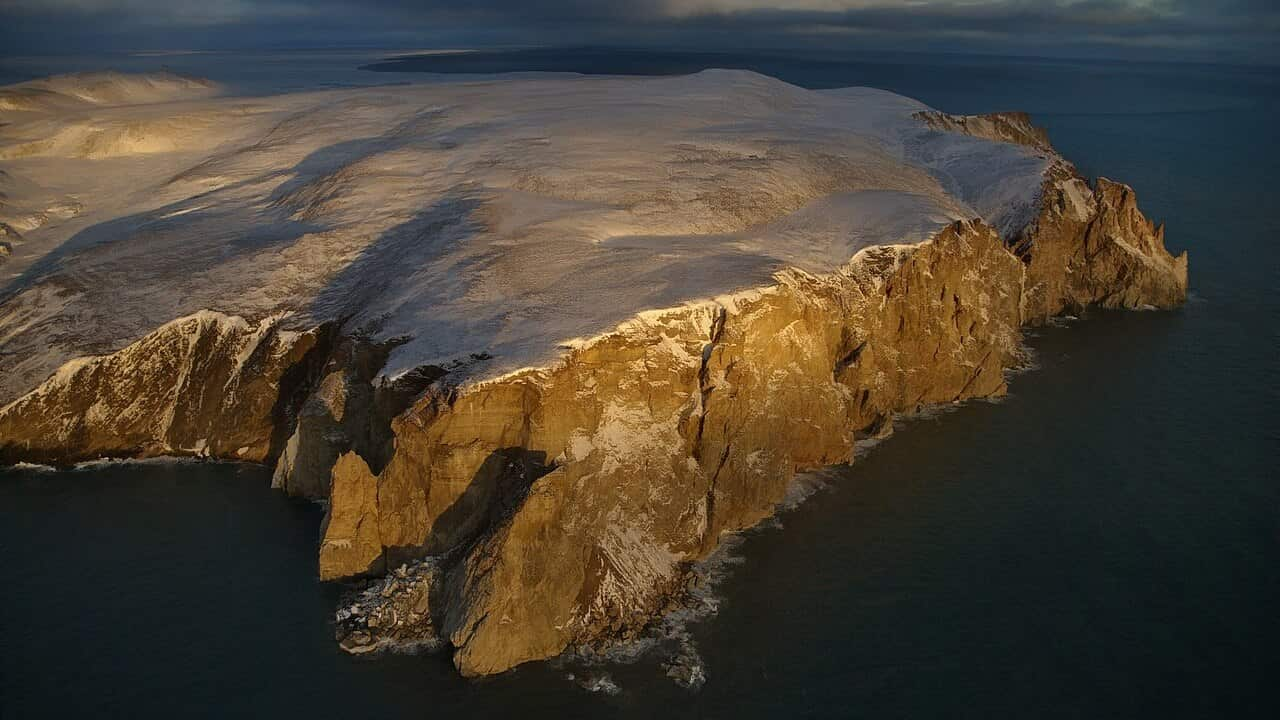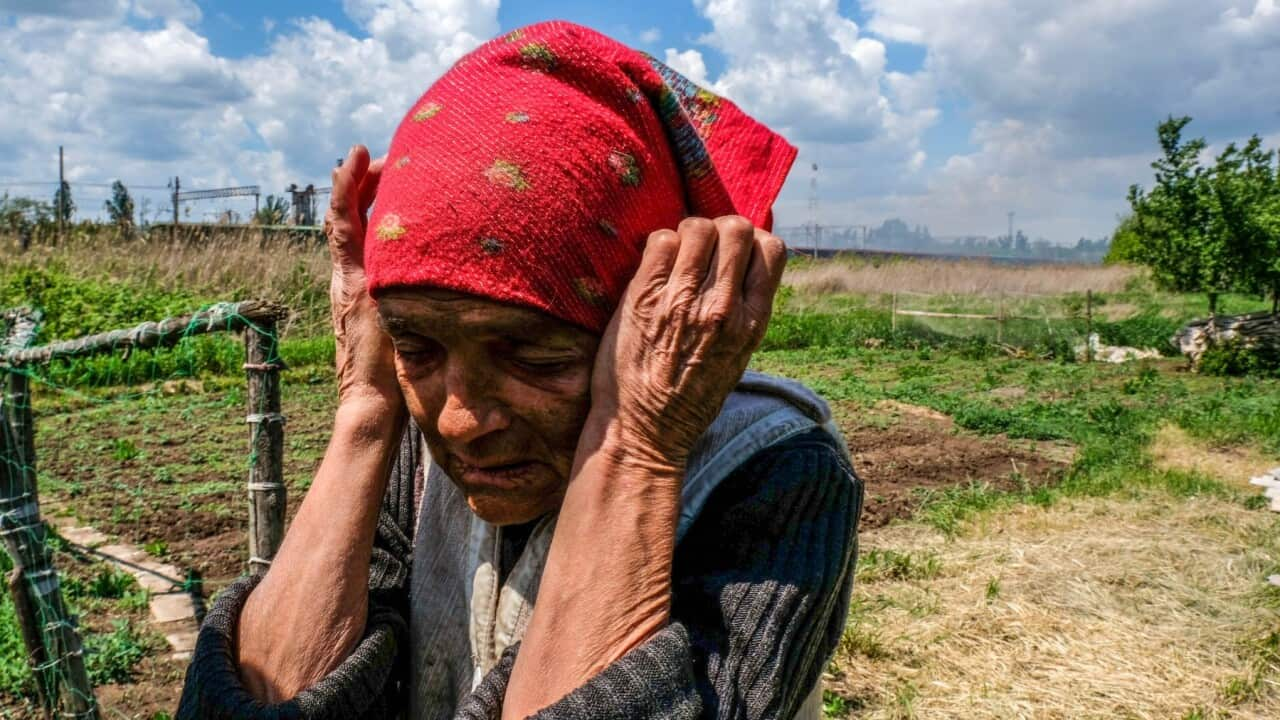

This article is more than 1 year old
Government urged to 'enforce' sanctions on Australian coalminer still operating in Russia
An ASX-listed company mining coal in northern Russia may soon privatise its operations after it was suspected of breaching Australia’s Russia sanctions regime, imposed as a result of the war in Ukraine.
Published 20 June 2023 4:09pm
By Lera Shvets
Source: SBS
Image: Wrangel island, Chukotka Autonomus Okrug. (Wikimedia/Boris Solovyev CC SA 4.0)
Key Points
- ASX-listed Tigers Realm was warned it may be in breach of Australia’s sanction laws.
- The company has been developing its business in Russia for over a decade.
- Transparency advocates are calling for Australia to avoid granting a sanctions permit to the company.
Calls are growing for the Australian government to review the activities of an Australian publicly listed coalminer still operating in Russia more than a year after the country’s invasion of Ukraine.
Tigers Realm Coal, which has been operating in Russia for more than a decade, by the Department of Foreign Affairs and Trade (DFAT) that it could be in breach of Australian sanctions.
There is now a call — from Transparency International Australia and Ukraine, the Australian Centre for International Justice and their Ukrainian partners at Razom We Stand — urging Foreign Minister Penny Wong to avoid granting a permit that would allow the company to continue sanctioned activities.
In a letter seen by SBS Russian, representatives of the four organisations have called for a review of Tigers Realm’s activities.
“In its ASX announcement, Tigers Realm mentioned that they might be seeking a permit. Our letter calls upon the Australian Sanctions Office and the minister to not grant that permit,” said Melissa Chen, a senior lawyer at the .
"A permit must not be granted unless it’s in the national interest to do so. Given Australia’s publicly strong stance in terms of its sanctions against Russia, the granting of such a permit would not and could not meet this national interest test."
Who is Tigers Realm?
Tigers Realm’s mining of coal in the Chukotka autonomous region has continued largely uninterrupted despite Moscow’s annexation of Crimea, the downing of MH17 by pro-Russian separatists in Donbas, and most recently, Russia’s full-scale invasion of Ukraine.
Established in 2010 and listed on the Australian Securities Exchange (ASX) as a junior mining and exploration company a year later, Tigers Realm initially disclosed assets in Colombia, Indonesia, Spain and Russia.
, the company’s CEO, Dmitry Gavrilin, said that over time the company focused on its Chukotka operations because “other projects have not proved to be economically viable or feasible in terms of geology and other factors”.
The company holds two exploration licences in Russia and has plans to become “
The company has been mining coal since 2017 on one of the two exploration sites and has been selling it to Asian markets.
“We are a de facto Russian company. We need a listing in Australia because there is traditionally a lot of investor interest in the coal industry there,” Peter Balka, the Australian mining businessman who was then Tigers Realm’s chief operating officer, .
Coal and sanctions
Immediately following the invasion of Ukraine in February 2022, a number of countries imposed trade sanctions on Russia.
The Australian government and introduced a against certain individuals and entities, while also banning the import and export of a number of goods to and from Russia, including coal.
Tigers Realm continued its mining operations and reported an increase in its annual sales revenue from $104 million in 2021 to $186 million in 2022, reflected in its .
However, in 2022, as stated in the annual report, and the company concentrated mostly on trade with China.
, Tigers Realm chairman Craig Wiggill praised management and the board for their focus on the continued and safe operation of the mine and port.
Management has found ways to adapt to the previously uncontemplated challenges to running a successful business in Russia.Craig Wiggill, Chairman of Tigers Realm
In April, more than a year after the war in Ukraine began, the company that DFAT had provided it with an indicative assessment that its operations may be in breach of Australia’s sanctions laws, a claim it denied.
In response, Tigers Realm that it would consider potential privatisation and delisting from the ASX at meetings in June and July.
Alternatively, as advised by DFAT, the company may apply for a permit to continue sanctioned activities.

Wrangel island, Chukotka Autonomus Okrug Credit: Wikimedia/Boris Solovyev CC SA 4.0
Information gap
According to Ms Chen, privatisation alone would not mean that Tigers Realm will be able to avoid the application of Australia’s sanctions laws.
“It doesn’t matter if it’s a private or public company. As long as they are incorporated in Australia and perform certain activity which is prohibited under Australia’s sanctions laws, then they should still be subject to those laws,” she said.
She pointed out that one of the shareholders of Tigers Realm is a company named RDIF Investment Management LLC.
Questions arise as to whether this company is the same as or closely related to the Russian Direct Investment Fund (RDIF), owned by the Russian government.
Tigers Realm back in 2014, and according to the company’s website, the fund's representatives have served on its board.
Ms Chen explained that there is a real “information gap” in terms of what Australia is doing to enforce its sanction laws.
“The Australian Sanctions Office does not release much information about what precisely they are doing to actually enforce the sanctions laws."
Because so little information is released, we don’t know if they have looked at that and if they have, they clearly have not taken any actions.Melissa Chen, Senior Lawyer, Australian Centre for International Justice
This view is shared by Ilya Shumanov, ex-director general of Transparency International Russia.
In March 2023, the Russian government designated Transparency International as an "undesirable organisation”.
As a result, Transparency International Russia’s governing body decided to begin the process of liquidation. Mr Shumanov now leads , a non-profit making investigations into Russia's Arctic region.
Mr Shumanov agrees that Australian authorities should start an investigation into the sanctions breach, pointing out that Australian legislation lacks clear guidance.
“The US, the UK and the EU have specific rules — the so-called 50 per cent rule — that determines who is considered the owner or controller of a company or entity for the purpose of imposing sanctions. In the US, for example, if a company is owned or controlled by sanctioned individuals or entities by 50 per cent or more, that company itself becomes subject to sanctions.
“As I understand, the Australian regulators have not issued any guidance or instructions on this specific point.”
In a statement provided to SBS Russian, a spokesperson for the Department of Foreign Affairs and Trade said that it would not be appropriate for it to comment on ongoing legal and regulatory matters.
"The Australian Sanctions Office within the Department of Foreign Affairs and Trade works closely with other Australian Government co-regulators including Defence Export Controls, Australian Border Force and Australian Federal Police to respond to sanctions contraventions,” the statement said.
'It's all about the money'
Josh Creaser is the spokesperson for , a community movement working across Australia to stop coal expansion and phase out coal by 2030.
He believes, “Russia’s invasion of Ukraine caused the price of coal to soar, and Australian miners cashed in. Tigers Realm has taken war profiteering from coal to shocking new lows".
In Mr Creaser's opinion, “This Australian company has deliberately sought to conduct coal mining ventures that help fund Russia’s war and is now attempting to wash its hands by seeking to privatise, evade sanctions and avoid being held accountable for its role in funding Russia’s bloody war on Ukraine.”
Tim Buckley, director of , said he is “not surprised” to see a mining company continue its business in Russia despite its invasion of Ukraine.
"It's all about the money. In the coal industry in a good year, you can make a fortune," he said.
China doesn't want to be dependent on Australia’s coal. We are 55 per cent of the world’s coking coal export. Therefore, China will happily buy from Russia.Tim Buckley, director, Climate Energy Finance
“Coal is all about externalising your costs — if you can get the government to provide you with a port, a railway and some free water. It’s all about externalising your infrastructure and harvesting subsidies from the government, then forgetting to undertake the mine rehabilitation cleanup costs at the end of the project's life,” Mr Buckley claimed.
Tigers Realm of an ‘Advanced Development Zone’ in the Chukotka region since 2015, which provides it with tax and customer advantages.
Eugene Simonov, an ecologist with the said these ‘Advanced Development Zones' immediately drew criticism from environmental NGOs and broader civil society when they emerged in draft legislation.
“The industrial projects of such zones did not require extensive public consultations and were protected from regular environmental inspections,” he explained.
“Then these zones started expanding to every corner of Siberia, where economic activity was still possible. A year before the war, vice-premier Yury Trutnev proposed that any plot of land in the Asian part of Russia, where any business seeks any kind of profit, should be developed as an ‘Advanced Development Zone’.
“This poses great danger to natural ecosystems and indigenous people who depend on them."
Coal mining in ‘Advanced Development Zones’ is the most extreme manifestation of this corrupt trend.Eugene Simonov, ecologist, Ukraine War Environmental Consequences Group

Wrangel island, Chukotka Autonomus Okrug Credit: Wikimedia/Boris Solovyev CC SA 4.0
“In most countries, the main challenge for a mining business is not bureaucracy, but rather rights of the local people living there,” Mr Balka continued.
“In Canada or Australia, there is always a chance to find yourself on the lands of indigenous people, even if you go really far away from any towns or settlements.”
If the road towards your mine goes through the lands of local Indigenous people, no bribes or threats will help you. People will stand on their rights, and you will never kick start the production.Peter Balka, ex-CEO of Tigers Realm
Altar, a local Indigenous community, resides close to Tigers Realm mining and exploration sites. In 2021, after with the region’s government over rights to its ancestral land, the legal entity of the community .
'Laws are meaningless unless enforced'
Ms Chen said the Australian Sanctions Office must strive to enforce its sanctions, otherwise, their effectiveness will be diminished.
“These sanctions are meaningless unless there are robust enforcement measures in place. If you have these sanctions on your books without actually taking action to make sure that assets are frozen and individuals and entities are investigated for breaching certain laws, then those laws will have no effect,” she added.
Clancy Moore, CEO of Transparency International Australia, echoed these sentiments.
The war in Ukraine has significantly increased the corruption and money laundering risks for Australian companies doing business in Russia.Clancy Moore, CEO, Transparency International Australia
"The lack of enforceable sanctions has only increased these risks for a company like Tigers Realm," Mr Moore believes.
“Any company engaging with Russian entities, including those that have been sanctioned, raises a giant red flag for money laundering authorities and may be enriching the Putin regime,” Mr Moore claimed.
Representatives of Tigers Realm have not responded to SBS Russian’s request for comment.
Share
